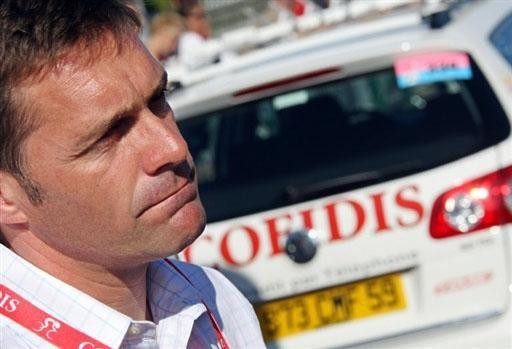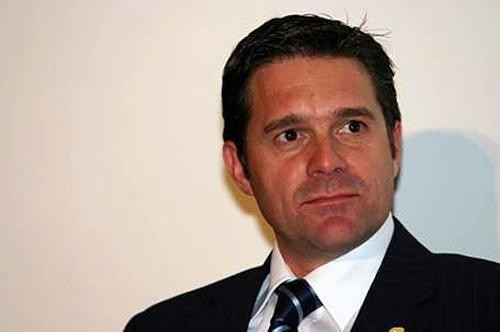ProTour 2011: AIGCP president raises questions
Eric Boyer, the head of the International Association of Professional Cycling teams (AIGCP), has...


News Feature, October 2, 2008
Eric Boyer, the head of the International Association of Professional Cycling teams (AIGCP), has voiced some concerns over the new ProTour agreement established between the UCI and the owners of the Grand Tour races. Speaking at the World Championships in Varese, Boyer told Cyclingnews that he was overall happy a new collaboration had been found, but wary of some of the consequences the new teams' points ranking system could have on the Professional Continental teams.
As International Cycling Union (UCI) president Pat McQuaid explained in a press conference last Friday in Varese, the Grand Tours will be on a "historical" calendar alongside the ProTour races on the World calendar. From 2011 onwards, both the "historical" races as well as the ProTour events will determine their participating teams through wildcard invitations, but also through a points ranking system, "that will see the top 17 teams automatically selected," according to McQuaid.
Cofidis manager and AIGCP president Eric Boyer, long-time at odds with the head of the UCI over the series, was pleased that the Grand Tour organisers had maintained some of their claims while working out the peace deal. "The owners of the Tour de France negotiated well," he said. "They wanted to collaborate with the UCI, but didn't want to be in the ProTour. And that's exactly what they achieved: they have kept their independence and their power. The rules to participation in their races, as well as their business as such are protected now."
The Frenchman emphasised that both race series had defended their rights well. "It was important to ASO that the UCI can continue its work on their races [meaning that the races owned by the company will be held under the aegis of the UCI again - ed.]," he continued. "The agreement also allows the continuity of the ProTour circuit. The teams that will have a ProTour licence will be obliged to enter the ProTour races. On the other hand, the organisers of the historic races – ASO, RCS sport and Unipublic – will hand out invitations. These two calendars will then allow the teams to score points in the new ranking system."
Boyer insisted that this new points system still needed some refinement, saying that it could disadvantage the Professional Continental teams in their bid to enter the Grand Tours on sporting merit. "The problem will be that those Pro Continental teams that will not be invited to ProTour races will score points only there where they are invited to start," he elaborated further. "Thus, for these teams there will be an imbalance. Potentially, they will not be able to get as many points as the ProTour teams. The ProTour teams, in this system, will be more advantaged than the Pro Continental teams."
Expanding the sport across the globe
Get The Leadout Newsletter
The latest race content, interviews, features, reviews and expert buying guides, direct to your inbox!
Boyer also had some criticism as to the UCI's objective of globalising cycling in order to be able to compete with other sports in terms of TV coverage. While he generally welcomed the efforts made by the governing body in that direction, he said that it was wrong to oblige top-level European teams to participate in some of these newest races, which moreover the UCI created too fast.
"Developing the sport outside of 'Old Europe' should not be a sine qua non condition to the evolution of cycling," he said when asked if he could understand the UCI's concerns of expanding elite cycling worldwide. "It's true that the sport has its foundations in Europe, and that it needs to create events outside of Europe. But this has to be done step by step, and not from one year to another. That is too fast. You can't create a race somewhere where there has never been one and then tell the teams, 'That's where you go now.' That's not going to work out.
"You need to give a country the time to create an event properly. You can't do this from one day to the next. What we need is evolution, not revolution."
Boyer cited the example of the Tour of Poland, whose public success he recognised. He maintained that the sudden obligation for European high-level teams to participate in the race created more problems that it offered solutions. "Here's a country that has great potential to develop their national tour. And from one day to the next, the teams are told, 'you are obliged to go there.' And that's where the mistake lies: in the obligation to participate. The Polish, while they have the potential to develop their races, don't have the know-how yet to do it. This year, there were problems in the organisation. The riders collectively abandoned one stage [stage four - ed.]. It was inevitable that the organisers would make mistakes - which led them to a situation of failure."
The AIGCP argued that many riders had a bad experience in Poland this year and did not want to go back in 2009. "We shouldn't frighten the riders by making them race in countries that don't have enough experience. We risk that the riders, then, do not want to go there. And I'm not going to encourage them to go, if they don't want to go."
According to Boyer, the Tour of Poland, as well as other newly-created events, should grow more slowly in order to subsist over time. "If we had given the organisers the chance to install their event over time, to invite more and more high-level teams each year, for a period over ten years, then it would have worked," he said. "I think we have to help them enter cycling, but not from one year to the next. It has to be a long-lasting process."